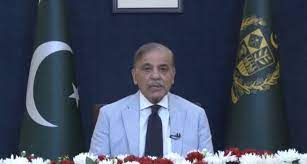Prime Minister Muhammad Shehbaz Sharif on Tuesday said that owing to the relentless efforts of the incumbent government, Pakistan had been out of the most difficult times. Addressing a ceremony at the General Headquarters (GHQ), to honour the supreme sacrifices of Shuhada and Ghazis, the Prime Minister stressed that they all had to strive to rebuild Pakistan collectively.
The Prime Minister said that the incumbent government would complete its term on Wednesday and after that they would hand over the reign of the government to an interim set-up in accordance with the Constitution. The Prime Minister’s office has prepared a summary requesting the President of Pakistan to dissolve the National Assembly upon maturity of its five year term.
The tenure of the current National Assembly will end after a few days on August 12, while a caretaker setup is due to assume its responsibility to oversee day-to-day governmental affairs, and ensure organisation of a free and fair nationwide election to pave the way for a democratically elected government in the country. Currently, several names mostly from the ruling political alliance are being circulated in the media as potential candidates for the slot for caretaker Prime Minister, however, the Prime Minister Shehbaz and the leader of the opposition in the National Assembly Raja Riaz could not achieve consensus at any person who steer the country during the crucial period of election.
Constitutionally and according to the practice in vague, the caretaker setup must consist of impartial individuals from non-political background to ensure credibility and transparency of the nationwide election. However, a strange legacy is being introduced by the outgoing coalition government by nominating its senior politicians as the candidate for the most sensitive position of the caretaker Prime Minister. An uncertainty prevails in the country regarding the general election scheduled for November and rumours regarding possible extension in the period of the caretaker government is being spread by some Federal Ministers, quoting some constitutional and technical reasons.
There are certain scenarios, legal constraints and political preferences of the civic groups and ruling coalition government that cause an ambiguity regarding the upcoming generation election as the Council of Common Interests (CCI) had recently approved the results of the 7th population census while the ECP has to chart out new delimitation of electoral constituencies to hold next election on the basis of current population, which is the longstanding demand of all political and ethnic groups in the country. Similarly, a constitutional check regarding tenure of the caretaker setup asked for holding of the general election with in the 90 days if the National Assembly is dissolved before completion of the stipulated period as compared to 60 days if it smoothly expires.
The current political situation presents a gloomy picture of the Country’s democracy and future political landscape not only in the context of the forthcoming general election but the political setup that emerged in the aftermath of the nationwide polls. The Election Commission of Pakistan (ECP) has officially disqualified Imran Khan for five years after the conviction of the PTI Chairman by the trial court,. The electoral watchdog also de-notified Mr. Khan from the National Assembly NA-45 Kurram. The recent conviction and denotification by the ECP has temporarily vanished the PTI Chief from the political scene while Khan’s decision regarding PTI’s participation in the next polls would not only have great impact on the future politics but would be crucial for cohesion and revival of his party that might face further contraction otherwise.
At the helm of this ongoing tripedation and anxiety, the role of the next caretaker government became more important and crucial. Meanwhile, the appointment of impartial and credible organizers is highly essential as it would not only validate the nationwide headcount but also crucial for consolidation of democracy and future political stability in the crisis-hit nation. A major political group is currently out from the ongoing bargain between the coalition government and a shady opposition leader who counts for less than a dozen opposition parliamentarians.
Therefore, the relevant state institutions particularly the ECP must play its constitutional role in ensuring appointment of a neutral and apolitical caretaker setup that steer the country on merit, implement rule of the law, promote political harmony and hold transparent elections in the country. So, the nation comes out of the current chaos and moves toward political stability and economic revival.







